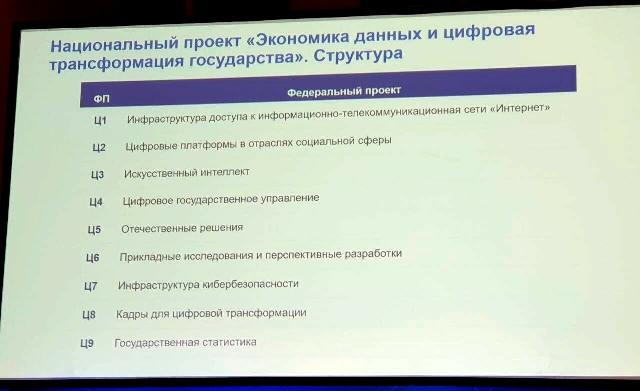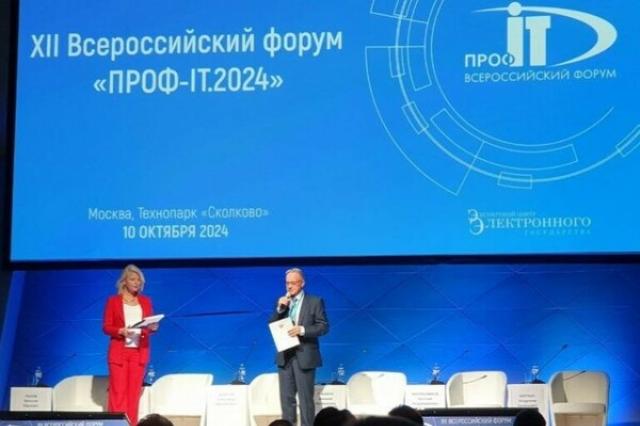On Thursday, the XII All-Russian Forum of Regional and Municipal Informatization "PROF-IT.2024" began in Skolkovo, new information was released during the plenary session, in particular, the national project "Data Economy and Digital Transformation of the state" will include nine federal projects, follows from the presentation by Alexey Chukarin, director of the Department of Digital Transformation and Coordination budget expenditures of the Ministry of Finance of Russia.
Eight projects were previously known. The new ninth one is dedicated to state statistics.

A frame from Alexey Chukarin's presentation
According to Chukarin, the fourth project, Digital Public Administration, is the most difficult to implement. Its goal is to switch to a new architecture and proactively provide certain services.
According to Chukarin, the platforms created by the Ministry of Finance, the Ministry of Transport, the Ministry of Health, etc. will not replace existing "good regional IT solutions." Replacing a well–functioning project is "utopia."
Commenting on the national project, Alexander Shoitov, Deputy Minister of Digital Development, Communications and Mass Media of the Russian Federation, cited statistics according to which the number of cyber fraud in Russia is growing by 20% per year.
The deputy minister also said that a unified platform for countering cyber fraud is being created in the country. Within the framework of this platform, it is planned to work with "promising risks", such as deepfakes.
According to the federal project "Internet Access Infrastructure", it is planned to "increase the number of functioning spacecraft of the low-orbit broadband satellite constellation from zero to 292" by 2030.
Planned indicators of the federal project "Digital platforms in social sectors":
The proportion of citizens is from 12 to 60 years old. using digital services based on industry platforms in the social sphere: from 0% in 2024 to 25% in 2030.
The share of school and college buildings in which Wi-Fi wireless networks have been created to provide Internet access and video surveillance of entrance groups has been provided – from 11% to 100%.
The number of school teachers provided with tablets based on the domestic mobile operating system for the organization of secure access to digital educational services and digital educational content – from 0 to 625 thousand people.
The share of public authorities of the subjects of the Russian Federation and local governments using digital services based on the industry platforms "Smart City" and "Safe Environment" — from 0 to 50%.
The share of scientific organizations using the digital platform "Science" as part of their core activities – from 0 to 100%.
The share of organizations in key sectors of the economy, state and municipal administration and the social sphere that have reached "digital maturity" through the use of industry–specific digital platforms has increased from 0 to 50%.
"Artificial intelligence"
The number of publications by Russian authors at conferences in the field of AI at A* level, cumulative, pcs.: 2024 – 36, 2030 – 912.
The share of organizations using software for processing, analyzing and providing data using AI, as well as products and services based on them: 2024 — 19%, 2030 — 29%.
The share of research and development results obtained through government support measures, tested and used in the industry: 2024 — 0%, 2030 — 35%.
"Digital Public administration"
The number of standard information systems that support the activities of regional executive authorities and MMS, implemented in at least 50% of subjects and providing public services online or proactively, implemented on the basis of a single digital platform, should increase from 0 to 10 units in 2030.
The number of FOIV information systems providing public services online or proactively — from 0 to five pieces.
The number of FOI information systems required for the performance of control (supervisory) functions in electronic form is from 0 to five pieces.
The share of state and municipal employees using a single digital HR platform is from 0 to 50%.
The share of applications for obtaining MSDS in electronic form using EPSU and RPGU in the total number of applications — from 50% to 60%.
"Domestic solutions"
The share of Russian-made GSM/LTE/5G base stations in the total volume of base stations installed annually is expected to grow from 0% in 2024 to 100% in 2030.
The share of priority business functions for which, with state co-financing, projects for the development and (or) refinement and implementation of domestic software have been launched — from 0% to 80%.
"Applied research and advanced developments"
The length of the created quantum networks for the national communication system: 2024 – 7000 km, 2030 – 15,000 km.
The number of qubits in the developed domestic quantum processor for the reporting year: 2024 – 50 units, 2030 – 300 units.
"Cybersecurity Infrastructure"
The share of financial organizations, telecom operators and digital platforms, and executive authorities involved in the system of countering crimes committed using information and telecommunications technologies should grow from 0% to 100% in 2030.
The average blocking time for phishing and fraudulent resources should decrease from nine hours in 2024 to four in 2030.
The share of critical GIS tested annually for reflection readiness will increase from 0 to 100%.
The speed of traffic processed by the automated security system of the Russian segment of the Internet information and telecommunications network, from 333.9 Tbit/s in 2024 to 560.1 Tbit/s.
OPR 2: The security of key government information systems has been ensured.
"Personnel for digital transformation"
The number of schoolchildren in grades 8-11 and students of secondary vocational education who received a certificate of mastering an additional general education program in modern programming languages, artificial intelligence or robotics implemented using state support measures: 2024 – 243 thousand people, 2030 – 643 thousand people.
The share of graduates trained in programs developed and/or updated with the participation of the IT industry in the total number of graduates of bachelor's and specialist's programs in the field of IT: 2024 – 0%, 2030 – 57%.
At the opening of the forum, an award ceremony was held for the winners of the IV National Competition "PROF-IT.Innovation"
The forum will last two days; the key theme of the business program is the national project "Data Economy and Digital Transformation of the state".

